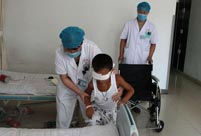Young women from the Xinjiang Uygur autonomous region join the navy.
Editor's note: On June 10, the Peace Ark embarked on a 118-day voyage to provide medical assistance in a number of countries and take part in joint operations and exercises with fellow members of ASEAN.
The surface of the Gulf of Aden was flat except for the water stirred up by the Chinese hospital ship Peace Ark.
"Dolphins!" exclaimed Nurpaxa Abduwayit as she stood in the pilothouse and pointed starboard, where a large pod of dolphins leapt out of the water, arcing gracefully through the air.
The 19-year-old female sailor ran onto the deck to join crewmembers watching the dolphins. The dolphins came to the surface to chase their quarry, a school of fish. Some burst out of the water again and again, the gray stripes and mottled areas on their skins clearly visible.
It was Nurpaxa's first cruise and her first sighting of dolphins. She said seeing them was like being at a carnival.
Because she was born and raised in Kashgar, a city in the Xinjiang Uygur autonomous region in China's inland northwest, all Nurpaxa's knowledge about the ocean came from television until she joined the People's Liberation Army navy two years ago.
The water was dark blue, so dark it was almost black. Nurpaxa watched the dolphins until they eventually glided out of sight. An evening breeze carried the clean smell of the ocean and ruffled her short, curly hair. Her brown eyes sparkled in the dusk.
In 2011, the PLA navy recruited 20 female Uygurs for the first time in its history. Three of the women were deployed on the Peace Ark, which is on a 118-day voyage, visiting eight countries and providing free medical services to locals.

 Mountain of garbage in Nairobi
Mountain of garbage in Nairobi Highlights of MAKS 2013 Int'l Aviation and Space Show
Highlights of MAKS 2013 Int'l Aviation and Space Show  10th China-ASEAN Expo opens in Nanning
10th China-ASEAN Expo opens in Nanning Eagle Boy takes to sky to break another record
Eagle Boy takes to sky to break another record 12-year-old boy becomes pillar of the family
12-year-old boy becomes pillar of the family Eye-gouged boy receives blind rehabilitation in Shanxi
Eye-gouged boy receives blind rehabilitation in Shanxi Top 10 naked hotels in the world
Top 10 naked hotels in the world The most gorgeous Chinese women in the eyes of foreigners
The most gorgeous Chinese women in the eyes of foreigners A collection of bizarre rooftop buildings around China
A collection of bizarre rooftop buildings around China Putin intimate contacts with marine animals
Putin intimate contacts with marine animals China's frigate 'Bengbu'in fire training
China's frigate 'Bengbu'in fire training Fresh students 'forced' to register in university independently
Fresh students 'forced' to register in university independently 2013 Taiwan Int'l Tourism Expo kicks off in Taipei
2013 Taiwan Int'l Tourism Expo kicks off in Taipei Photo story: Take a gap year
Photo story: Take a gap year Nokia's Global Headquarters: visiting a declining empire
Nokia's Global Headquarters: visiting a declining empireDay|Week|Month